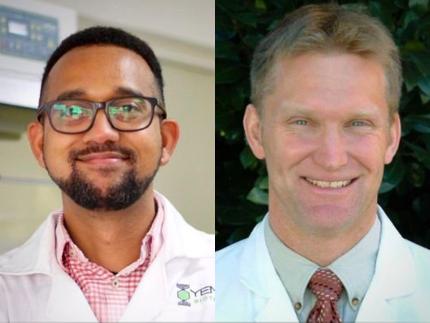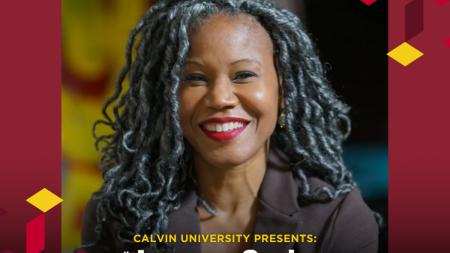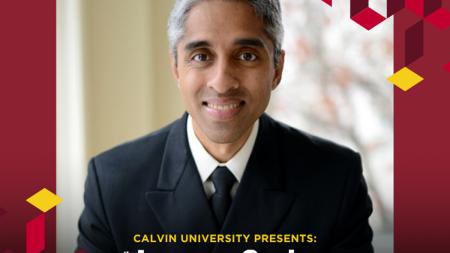Medical Experts Speak at Calvin

Calvin University’s new School of Health kicked off a speaker series last week with presentations from Dr. Yaw Bediako and Dr. Chris Holstege, both alumni of the university.
Bediako is a cofounder of Yemaachi BioTech, a cutting-edge biotechnology research company headquartered in Accra, Ghana. Holstege is a professor in the departments of medicine and pediatrics at the University of Virginia School of Medicine. He is an internationally renowned toxicologist and academician.
The two doctors sit on the School of Health’s advisory council, and their work and research are well regarded in medical circles and beyond.
“Doctors Bediako and Holstege are esteemed among their peers and are doing important innovative work in their fields,” said Adejoke Ayoola, the newly appointed dean of the Calvin University School of Health, in a Calvin University press release.
“To have the opportunity to hear about what’s happening on the cutting edge of science from practitioners who are themselves leading in these areas is a gift to not only the Calvin community but also to West Michigan and beyond.”
Bediako's presentation launched the Calvin University School of Health Speakers series on Sept. 29, and Holstege’s presentation followed on Sept. 30. Earlier that day, Holstege also received a distinguished alumni award from the university.
Seeding Africa with Research
Having done research and having taught in several places, Bediako said he returned to his African roots to build a company that uses genomic research and artificial intelligence, along with other modalities and tools, to focus on cancer research as well as researching infectious and noninfectious diseases across the continent.
“In 2019, I moved back to Ghana to open the biotech company to research a range of health problems in Africa, which, because of a lack of resources, has not been doing the research that it needs to do,” said Bediako.
Much of the money for research comes from North America and Europe, so, said Bediako, his company is building relations with nonprofit groups, the World Bank, large drug companies, and organizations such as the National Institutes of Health in the U.S. in order to tap into those streams of funding.
“We are looking to find ways to accelerate research across Africa. We want to use biotechnology to develop tools people in Africa can use.”
In addition, he said, he is seeking to hire top-flight African scientists to work at his company.
“Capacity development is important for us,” he stated in his presentation at the Calvin University Covenant Fine Arts Center. “Africa already has enough trained doctors and nurses, but there is a brain drain. Our best continually leave to work in the U.S. and Europe.”
While his company is a start-up, it is already shipping its recently launched Sheba-HPV test, enabling Ghanaian women to screen for cervical cancer at home.
And although cancer is a significant part of their work, the company has also branched into research on COVID-19 vaccines.
Earlier this year, said Bediako, his company, in partnership with the Francis Crick Institute in London, launched a new study to monitor immune function in response to COVID-19 vaccines and to compare immune responses to the same vaccine in both African and European populations.
“We believe what we are doing is a new dawn for health research in Africa,” he said. “The whole point is to develop diverse therapies” for the widely diverse populations of Africa.
Another goal, he said, “is to have kids from America – and Calvin University – want to come to Africa to work for us.”
Chasing Down Poisoners
Holstege, a 1988 Calvin graduate, has traveled the world consulting on many cases connected to criminal poisoning, substance abuse, and weapons of mass destruction. He has also consulted with several top-selling authors who have wanted to tap into his background as a toxicologist and to hear about his involvement in different cases.
During his talk, he said that some of the cases he has consulted on involved a spouse poisoning another spouse, political figures and other high-profile people who were poisoned, and a microbiologist and biodefense engineer who was likely behind the 2001 anthrax attacks that killed five people. That person killed himself before charges were brought against him.
A theme running through Holstege’s remarks had to do with substance abuse and especially how certain drugs are being tampered with and killing people who aren’t aware of what they are taking.
“Misuse of drugs has become a huge issue as a plethora of drugs are coming into the U.S., ” he said. “Many of these drugs have been manufactured by chemists overseas.”
For example, the use of opioids, laced with other drugs such as fentanyl, has mushroomed, and U.S. officials and others have not been able to keep up with the many drugs – several of them lethal – that have flooded the streets in recent years.
Another problem is the sale and use of marijuana that is marketed under different forms, ranging from candy to cookies and from pills packed with THC, the effective chemical element in marijuana, to oils and tinctures containing the drug.
“You never know exactly what you are getting when you use these products,” he said. Even though marijuana use is now legal in many states, he said, “there is simply no quality control over these things.”
Holstege added that it is a lie that the chronic use of marijuana has no negative effects on people. “There are evidence-based studies showing that cannabis alters brain development and decreases the IQ.”
Another problem with the sale and use of marijuana is that organized crime is behind the distribution of the drug to many of the outlets now selling the drug in its various forms. In other words, “you are supporting organized crime when you buy this drug,” said Holstege.
As part of his job, said Holstege, he works in the emergency department at the University of Virginia Hospital and is often asked to assess and treat patients who have overdosed on drugs or taken some form of poison. Along these lines, he works closely with students at the university who have substance abuse problems.
During a question and answer session after his talk, Holstege was asked how his Christian faith plays into his profession, which has taken him to some deeply troubled places and put him into contact with some dangerous, malicious people.
“It can be a brutal world, and [there’s] a lot of psychopathology out there,” said Holstege. “We come across state-sponsored terrorists and those who think about doing something [who] then go ahead and do it.”
But “as Christians,” he added, “we know it is a dark world, a broken world. And what are we to do about it?”
Above all, he said, Christians are called to get involved in the world “to look after the vulnerable. This is a worldview I learned at Calvin. . . . Personally, I don’t like to see things covered up.”
In addition, he said, Christians ought to do what they can if they see harm occurring. “We want to assure that justice is brought to those who are victims,” said Holstege.
Bringing about justice, whether in the hospital or in criminal cases or in assessments of poison use in various circumstances, said Holstege, is what it is all about for him.
“As Christians, we should step forward and be looking to do good in the world,” he said.


